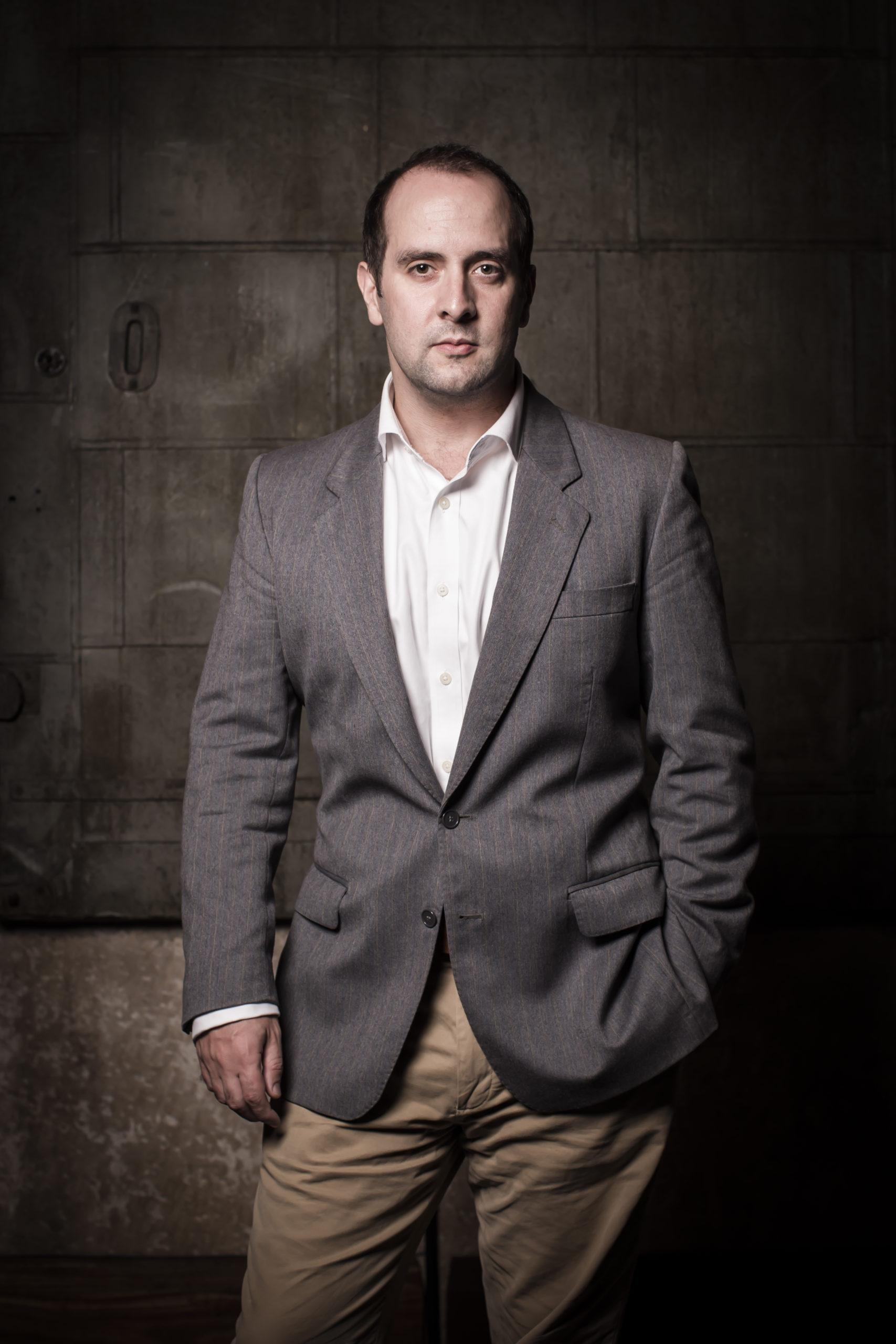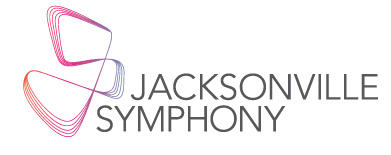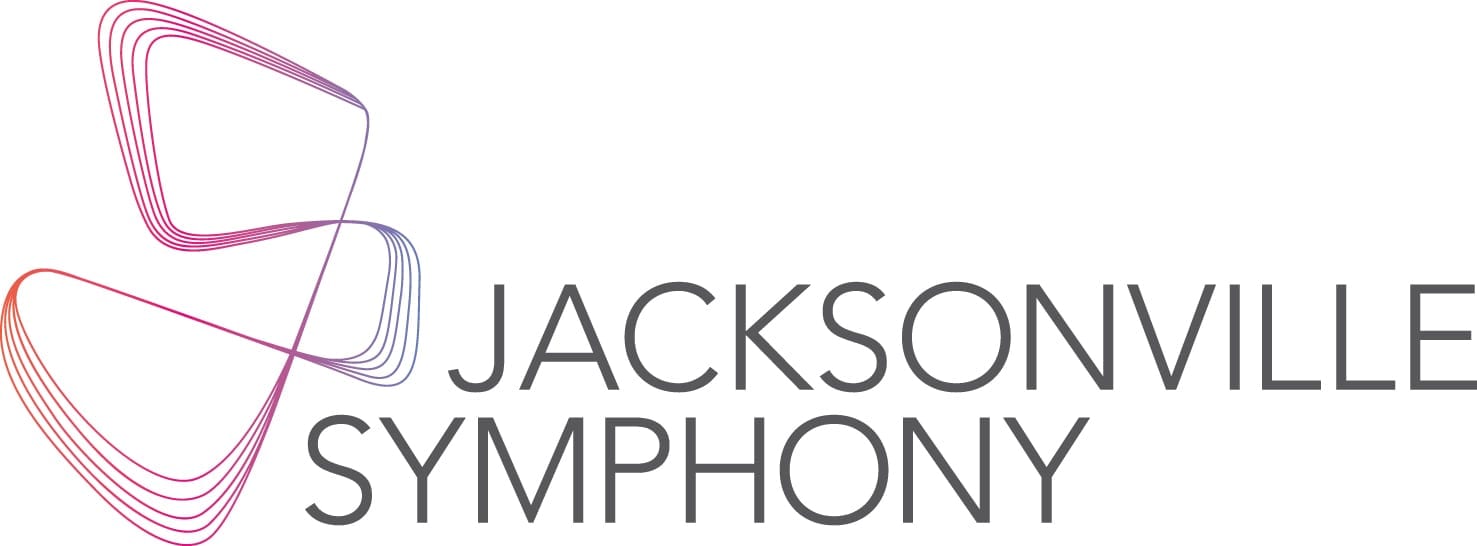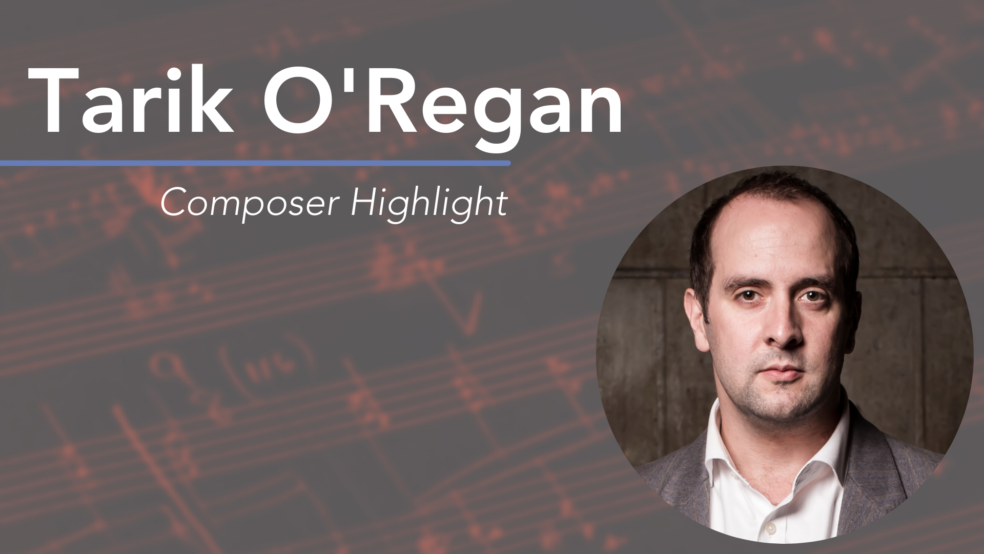Digital Marketing Manager Nicholas V. Hall shares what he believes to be an important part of orchestral repertoire: new music with living composers. By speaking directly to the artists of today, we learn what it means to be a living composer.
Composer Highlight: Tarik O’Regan
“Write for your peers: people around you, people you know, people studying with you, friends etc. These re going to be the most important champions of your work as you progress through your careers together.”
“New Music” is not something often associated with symphonic orchestral performances. However, this week Jacoby Symphony Hall will have something new on the program. Friday, April 8, and Saturday, April 9, at 7:30 PM, the Jacksonville Symphony will be performing a program that includes a piece by living composer Tarik O’Regan. Continue reading below to hear straight from the composer and learn more about the upcoming performance. As an audience member, you might be concerned about listening to something new. However, attending a program with the work of a living composer gives you the opportunity to be a part of history as the sounds of “Raï” by Tarik O’Regan will be heard within Jacoby Symphony Hall. Learn more about the full program and purchase tickets on the Mozart’s Groundbreaker event page.
Q&A Introductions
Nicholas V. Hall: Hello Tarik, allow me to introduce myself. My name is Nicholas and I am the Digital Marketing Manager with the Jacksonville Symphony. Outside of my role within the symphony I am also a percussionist and a composer. Being a performer/composer myself, I would like to thank you for your time in answering these questions. I believe it is important to connect our audience to living composers and hear straight from the voice of the artist.
The Musical Journey
NVH: To start, I’d like to ask the question all artists are asked many times throughout their career. Although it might seem trivial to talk about oneself, I find everyone’s individual story to be quite interesting.
NVH: How did you get into music? Did you have any other aspirations?
Tarik O’Regan: My parents! But in a passive way, as they didn’t play any musical instruments or sing in choirs for example. There was always a variety of music around the house. My mother had a lot of LPs by British rock bands (Led Zeppelin, The Who, The Rolling Stones etc.), which she’d bought in Morocco and Algeria before moving to the UK. My father listened more to jazz – both big band and smaller ensembles. The radio – Capital FM if I recall correctly – was frequently on at home and in the car, playing the hits of the day (that glorious decade of pop music that was the 1980s)! And when we visited family in North Africa, we’d always bring back a few tapes of local music (cassette tapes were ubiquitous there and then), often recordings of various oud players. All to say, I was surrounded by a lot of varied music which was always treated as equally relevant and worth listening to. So, when I was at high school in the early 1990s, playing drums in various rock and jazz bands, it seemed like a perfectly logical development to start playing orchestral percussion, and to add this new genre to the others to which I’d been exposed. That experience, coupled with some amazingly forward-thinking teachers, led me to take up percussion more seriously at the Royal College of Music Junior Department in London. And there, during one extremely long rehearsal in which I wasn’t doing much (the one solitary cymbal strike in Dvorak’s Symphony No. 9), I started to think about writing the stuff instead of playing it!
NVH: It seems like from a young age there was certainly an abundance of different musical styles present within your daily routine. Having such a diverse sense of music while developing into a musician, I’m sure once you found yourself writing music you had quite a bit of experiment to find where you felt comfortable in your style today.
NVH: How would you describe your style, and are there any strong musical influences?
TO’R: The influences are probably the best indicator of my style, so I’ve split them into three groups:
- Composers I listen to and whose influences I can hear in my own music. Medieval and Renaissance composers such as Machaut, Dufay, Gombert, Tallis, Lassus and Byrd. Then a jump to the sort of modernists that are probably heard in the music of many people, but for me it’s Stravinsky, Bartok, Britten and Schoenberg. And the minimalist composers: Steve Reich, Philip Glass, Michael Nyman and lesser-known composers such as the British minimalist Andrew Poppy.
- omposers who don’t write music like me, yet by certain aspects of their work I’m very influenced, particularly the handling of drama and pacing which is so crucial. This list includes Harrison Birtwistle, Salvatore Sciarrino, Kaija Saariaho, George Benjamin, Olga Neuwirth, Sebastian Currier, Alvin Singleton, and Morton Feldman.
- The excitement of being alive and around a bunch of amazing peers. We’re going through a bit of a golden age, I think. The fact that all these people are out there writing music, and people are coming to hear it, really validates what I do and is hugely influential in its own way. I’ll mention just a few people here in no particular order: Joseph Phibbs, Helen Grime, Anna Clyne, Vijay Iyer, Errollyn Wallen, Tyshawn Sorey, and Hannah Kendall.
Influences Beyond Music
NVH: I like that from a musical perspective, you recognize and respect music that is unlike your own but can still draw inspirations from those styles. In a similar sense, there can be many ‘non-musical’ influences that can equally influence music. Personally, I find outside influences to be an incredible inspiration.
NVH: Do you find yourself drawn, and finding inspiration, from other artforms and cultures outside of music regularly? If so, what is an inspiration that you have yet to use but wish to for a future work?
TO’R: Yes, absolutely. Recently I’ve found myself very drawn to architectural histories, for example. I’m fascinated by the balance of functional and aesthetic goals in architecture, and how that relates to musical composition. I’ve always wanted to write a piece of music somehow connected to typography!
NVH: I would love to see that piece come to life! Somehow representing different fonts or different letters to musical styles and emotions. In that sense, inspiration is an interesting concept, and as a creative myself, I know that inspiration does no always come in the same form for every project.
NVH: When approaching a new project, what would you say is the hardest part in finding inspiration to start a new piece of music?
TO’R: Honestly, I think it’s the amount of pressure a composer can put on themselves to write something which is going to stand the test of time. This can be a very debilitating thought pattern and can shut down naturally-occurring ideas. Living composers are always under the shadow of that 0.1% of composers from past eras whose works are still performed regularly. Because these pieces form an extremely tiny percentage of all music that has existed, but a very large percentage of music performed in concerts today (and I know there is a lot being done today to broaden performances of historic repertoire), composers can be prone to having a false sense of worth, of what is good, of what is valued, and this can often cloud their thinking. I certainly have to actively clear my mind of these types of thoughts prior to embarking on a new piece.
The Audience Experience
NVH: Moving away from the writing process of being a composer, I am always curious to hear a composer’s “elevator pitch,” so to speak.
NVH: If you had just a brief moment to capture someone’s curiosity about your music who has yet to hear it, what should they listen for within the upcoming performance of your piece “Raï?”
TO’R: Sure! Try to tap your foot to the piece once the main riff comes in, about a minute into the piece. It’s in seven here, but the pattern is split across a two-measure motif. So, half the time your foot will feel on the beat, and the other half it will feel off the beat. If you don’t get seasick, stick with it, and every two measures you’ll re-connect with Courtney’s downbeat!
NVH:“Raï” sounds like an exciting piece, and having listened to a recording already, I look forward to seeing the orchestra perform it live. I also look forward to hearing future works of yours and will be keeping an eye out for upcoming performances.
NVH: Are there any projects you are especially excited about? What can we expect to see from you in the near future?
TO’R: The piece I’m finishing for you right now: Trances. It’s another fast-paced work for orchestra and will conclude a trilogy of works which actually began with Raï. These are pieces in which I meditate upon North African popular and folk music forms. Rather than being ethnographic studies, in these works I am interested in how I recall the music of my youth, and of my own heritage, through the haze of memory. Specifically, in Trances I’m trying to define a texture of reminiscence
Advice to Composers
NVH: The Jacksonville Symphony is proud to be performing your piece this coming weekend and we are looking forward to your new work to be premiere in June. I would like to thank you again for your time to answer our questions as we approach the performance of “Raï” this April. As a composer myself, I would like to end this Q&A with one question to any young composers that may be reading.
NVH: If you had one piece of advice you could give your younger self, or young composers today, what would that be?
TO’R:Write for your peers: people around you, people you know, people studying with you, friends etc. These are going to be the most important champions of your work as you progress through your careers together. Yes, it’s great to have some professional performances of your work at an early age, but don’t expend so much energy pursuing those types of high-profile opportunities that you miss those quieter prospects right under your nose.
Tarik O’Regan

2020/21 sees the release of three albums of O’Regan’s compositions: Pentatone brings out Houston Grand Opera’s production of The Phoenix, in which Thomas Hampson and Luca Pisaroni both interpret the role of Lorenzo Da Ponte; on Naxos, Chamber Choir Ireland and the Irish Chamber Orchestra perform A Letter of Rights, a large-scale collaboration with Alice Goodman which meditates on the civil rights enshrined in Magna Carta; and All Things Common is a portrait album by Pacific Chorale on the Yarlung label. He is currently working on a saxophone concerto, which has been commissioned for soloist Amy Dickson by the Presteigne Festival to be premiered in 2022.
O’Regan’s music is described as “exquisite and delicate” (The Washington Post); “beautifully-imagined, holding the audience rapt” (The Financial Times); “sublime: a piece that you didn’t want to end” (The Times, London); and generating “previously unheard sound worlds with astonishing effect” (The Philadelphia Inquirer).
Born in 1978, Tarik O’Regan has worked with a wide variety of ensembles and organizations; these include the Dutch National Ballet, BBC Symphony Orchestra, Royal Philharmonic Orchestra, Australian Chamber Orchestra, BBC National Orchestra of Wales, Estonian Philharmonic Chamber Choir, Sydney Dance Company, BBC Proms at the Royal Albert Hall, and the Royal Opera House in London.
Recorded on over 40 albums and published exclusively by Novello, his work has regularly receives many recognitions: two GRAMMY® nominations (including Best Classical Album,) and both New York Times and Philadelphia Inquirer Best Classical Releases of the Year for Threshold of Night; the NEA Artistic Excellence Award and a South Bank Sky Arts Award nomination for Heart of Darkness; a Gramophone Award nomination for Scattered Rhymes; two British Composer Awards; Time Out London (Top Five Concerts of the Year), WQXR/Q2 (CD of the Week) and WNYC (Pick of the Week).
“One of the leading British composers of his generation” (Gramophone) who is writing “music of startling beauty” (The Observer), Tarik O’Regan was born in London in 1978. He grew up predominantly in Croydon, South London, spending some of his childhood in Morocco, where his mother was born, and in Algeria. Following the completion of his undergraduate studies at Pembroke College, Oxford, and private study with Jeremy Dale Roberts, he began serving as the classical recordings reviewer for The Observer newspaper, a position he held for four years. During part of this time he also worked for investment bank JPMorgan Chase. O’Regan then continued his postgraduate studies in composition under the direction of both Robin Holloway at Cambridge University, where he was appointed Composer-in-Residence at Corpus Christi College, and Robert Saxton.
O’Regan has been appointed to the Fulbright Chester Schirmer Fellowship at Columbia University; a Radcliffe Institute Fellowship at Harvard; and positions at Trinity and Corpus Christi Colleges in Cambridge, the Institute for Advanced Study in Princeton, and Yale. He has served on the composition faculty of Rutgers University, and as Senior Advisor to the Center for Ballet and the Arts at New York University. A frequent television and radio broadcaster, O’Regan has written and presented two documentaries for BBC Radio 4: Composing LA and Composing New York. In 2017, he was elected to an Honorary Fellowship of Pembroke College, Oxford and to the board of Yaddo, one of the oldest artist communities in the USA. O’Regan currently holds the positions of Visiting Artist at Stanford University and Artistic Partner with Philharmonia Baroque Orchestra & Chorale.
Learn More & Watch Live
To learn more about this program, be sure to read the full program notes or visit the event page. Tickets are still available and can be purchased online or at the box office. Can’t make it to the performance? This event will be live-streamed on our Jacoby Symphony Hall Live page! Interested in learning more about Tarik O’Regan? Visit his webpage for a full list of works and upcoming events.
By Nicholas V. Hall, Digital Marketing Manager


